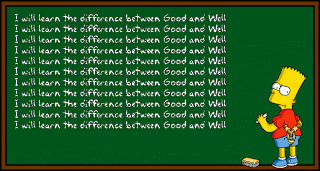Hopefully, this little blog of mine will help spread the word, and save the world one properly used adverb at a time.
"Good" is an adjective. It tells what something or someone is like. Usually it's used before a noun or after a linking verb.
Examples: That was a good game.
Carina is good at English ;)
"Well" is generally used as an adverb. It tells how something is done. It is generally used after an action verb.
Example: Nick does Math well.
She did well on her test.
Here's the kicker and confusing part for most people: "well" should also be used as an adjective meaning "in good health."
Example: I don't feel well today.
"Doing good" implies you are working with a charity, recycling your trash more, etc...
"Doing well" means things are going positively for you.
 I swear I'm not the kind of person who corrects someone's grammar in conversations... but I AM thinking it. This is just my little indirect way of getting the point across.
I swear I'm not the kind of person who corrects someone's grammar in conversations... but I AM thinking it. This is just my little indirect way of getting the point across.



2 comments:
Hi, this is your Dad... good point you made about the difference between, and different uses for "well" and "good". But do consider this: "These people are really good (at what they do)"; or "This man is good (at heart)" i.m.o. makes "good" an adverb in these cases.
That 's all well and good, but I really don't want to get into a proper grammar/language use with you, but do want to point out this: strictly speaking, the use of "hopefully" in your context is/was incorrect, and (used to) carry the meaning of "expectant, with hope (in one's heart)". Now, however, through colloquial (nice word) use, it has "acquired" the additional (informal) meaning of "I hope", "Let's hope", and that makes the use in your context correct. It's something like the word "loan", which is/was in truth a noun, but again, due to its colloquial use, it is now poper to use it as a verb ("I loaned him some money", where we used to say "I lent him some money"). Well, that's the English lesson for today; isn't language wonderful? That's what we mean by "living language": it changes through customs and use. Love, your Dad.
Leave it to my Dad to correct my attempt at a grammar lesson... whoops
Post a Comment